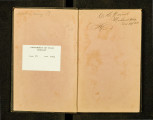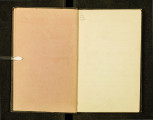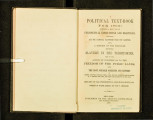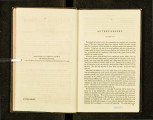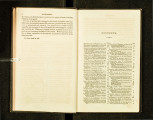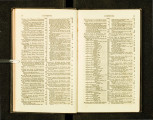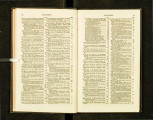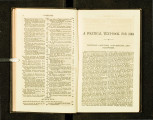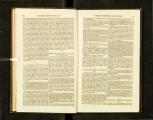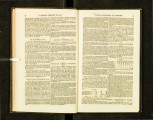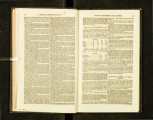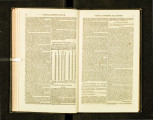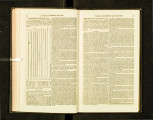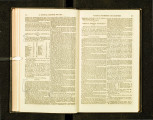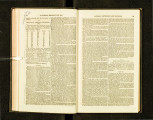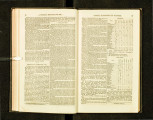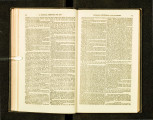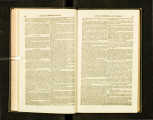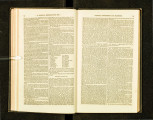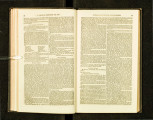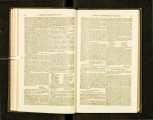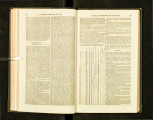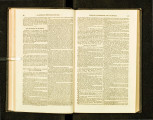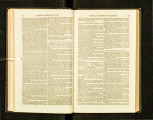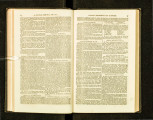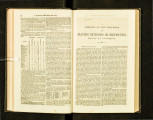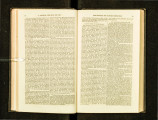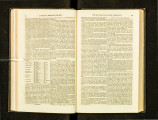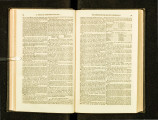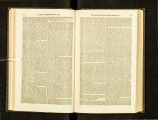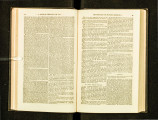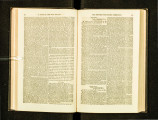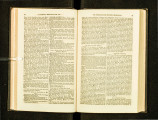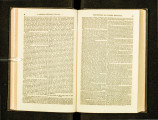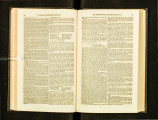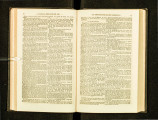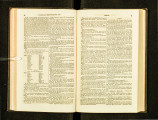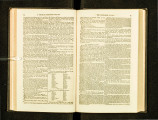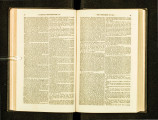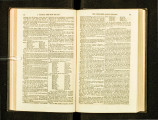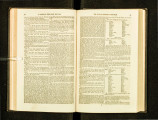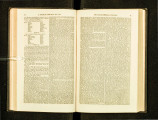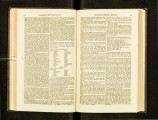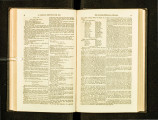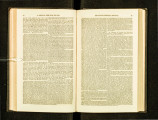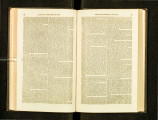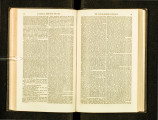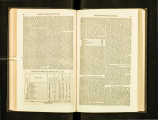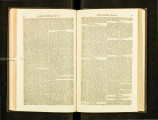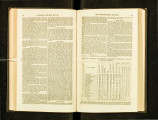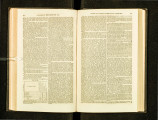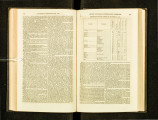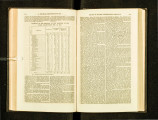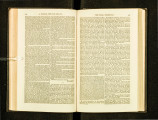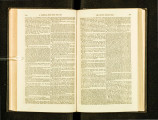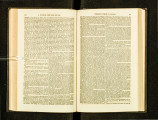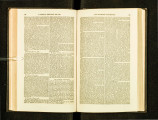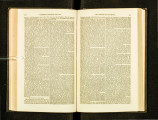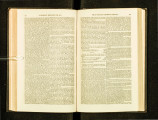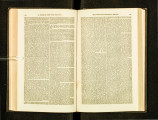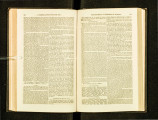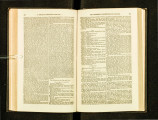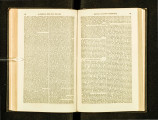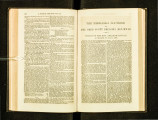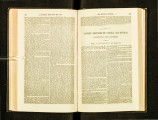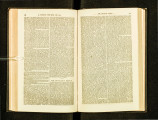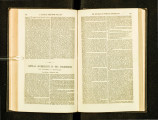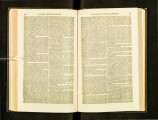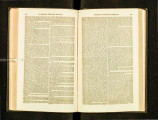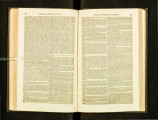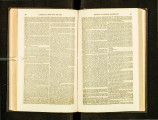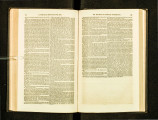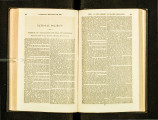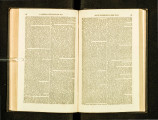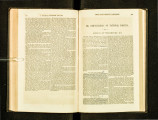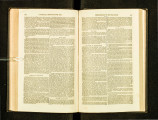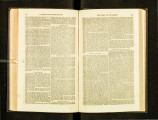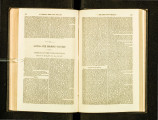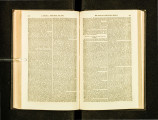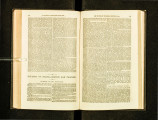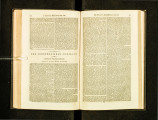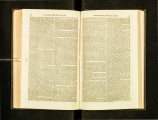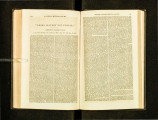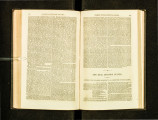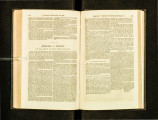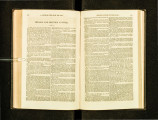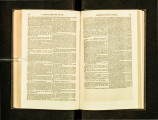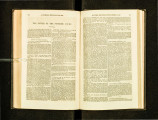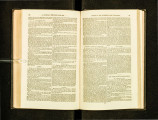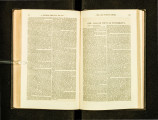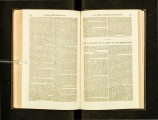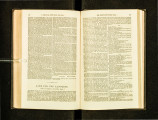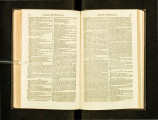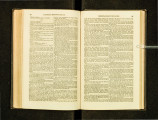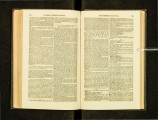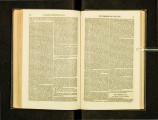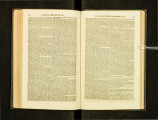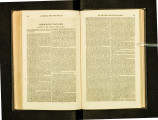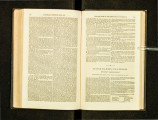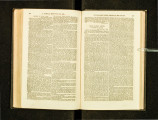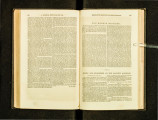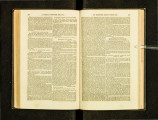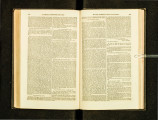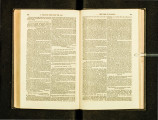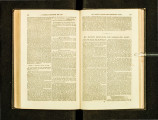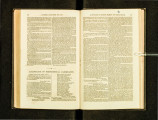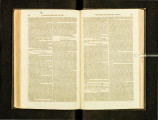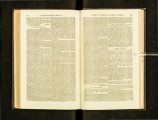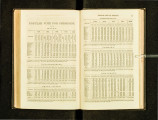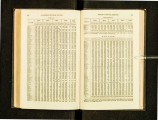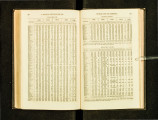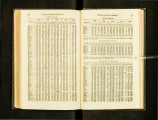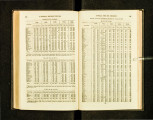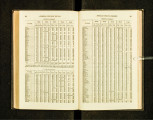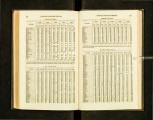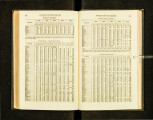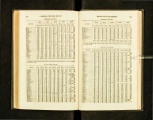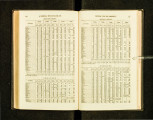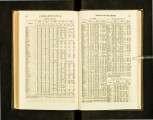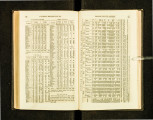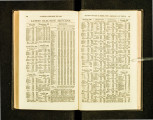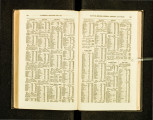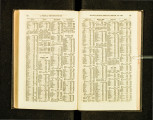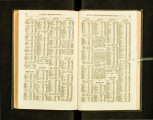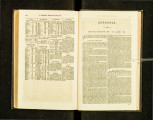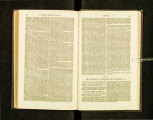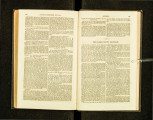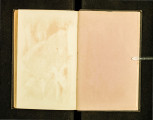| OCR Text |
Show ) 80 A POLITICAL TEXT-BOOK FOR 1860. plated, no hint was ndoetl that the Nebraska re ion wa!:! opt•neu thereby to lnvc.ry .. ~c vt• r.d pctirions for the organtr.atton of a T'-'niwn· wcRtW:Lnl of :\fi~l'lOlll'i and Iowa were pn·:-et tt<:d at tilt· s(':-:3ion of 1 .)1.-i, but no decj, ivc adion tal<en th •rcou. unttl the n ext ·es:< ion, when, lin·. t:Hh. - }lr. W. I'. llall, of lfo., pur ·u:mt . lO lt\ 1 ti~ ·, "nlHnittc<l to the House~ bill to orga.n' 1z,• tile 'l'nritory of l'latt: , wh11; l~, wa.s r?ad tl\ it'c, and ;-;,· ttL to tile COillltllltcc 011 1 c rntone:;. Fro111 LlwL Contt nit tee, PHJ. :J.tl, 1 o53.-llr. W. !\.. R icha;·dso.n, of 111. .• reportt>tl l l bill to organtze the. fetTt tory of Kcbra~l~a, which was read twt~e and commi ttcd. Feb. 9lh.-The bill was ot·dcred to be taken :>ut ()f Committee, on motion of W. P. Hall. FPb. lOt.'t.-Thc b ill was reported from the Committee of the Whole to the llouse, with a recornmenuatiou that it do not pas . llr:'. Rtchardson moved the previous question, whi<·h prevailed. .\Jr. Letc h er, of Va., moved that the bill uo lie on the table. Lost: Ycns,40 (mainly Southern); Na~·'.l, lOi. The uill was then cngro ~scd, read n. third time , and p:t sed. Yeas, 98; Nays, 43, (as befot·e.) Feb. lllh.-TIIc bill reached the Senate and was rcl'e rrcd LO the Committee on 'l'c tTitorics. Feb. 17 th.-llr. Douglas t·e portcu it without n mcndme 11 t. Jlarc!t 'l.d - , L;t ·t day but one of tht3 session), ~fr. Dourrlas mo ved that the bill be taken up: Lo~t: Yeas, :W; (all ~orthem uut Atchisou and Geyer, of Mo. ;) Kays, 25 ; (21 Soutbcm, 4 North em.) Jfarch 3nl.-llt·. Douglas again moved that the bill be takeu np. Mr. B odand, o f ..:\rk., moveJ that it uo lte on the table. C:trri c1l: Y cas, 2:); (all outheru but 4 ;) Naytl, 17 ; tall ~orthcl'll IJut Atcltii'!On and Ge y e r. J 'o the bill wa.:; put to Jeep for the se :<ion. On the motic11 to take np-- ~tr. Rusk of Texas objcctiug- j{,· .• \ tchisou said: I must ask t.he in elulgcnce or the enate to say one woru in 1''.}\utlon to this 111:\tter l'erhap~ thCrt:l is not a State in the Union more elceply in tere:~teu in this question than the ~tat.e of ~~b~ouri. 11 not the la rgest, 1 will say the best, ponlon of that 'J'erritory, perhaps the only portion of it thu.t in h:df 1\ centu•·y will l.>ecome a ~ tat e, lies immediately we:;t of tho 'tate of l\Iissoud. H is only a question of tiroe, whether we will org;mize the Territory at this se:ssion of Con:; es:~, or whether we wiU do it at the next sc~l!ion ; and, for my own part., I acknowledge now ~hat at; the ~onator from Illinoi~ well knows, when 1 came to thi~ city, at the heginninK of the last session, I wa~ perhaps us mudt opposed to the pro· position, as the ' enator from Texas now is. The '-'enntor from Iowa know:; it; nnd it 'I.O(.{JI jot• 1·easmu which I 1oill Mt now mention or 8tt(lfJe1Jt. llut, sir, I have from reflection and investigation iu my own mind, and from the opinions of others- my constituent!!, whose opinions I am bound to respect-come to the conclusion \hat now is the time for the orga.nixation of this 'fet·ritory, It is the most propitious time. 'l'he treaties with the various louian tribes, the title!! to whose possessions must be extinguished, can better be made now than at any future time; for, as the question Is agitated, and as it is understood, white men, SJH.•cuh\tors, will intet·pose, and interfere, 1\od the longer it is postponed the more we will have to fear from them, and the more difficult it will be to extinguish the Indlan title In that country, &nd the harder the terms to be imposed. Therefore, Mr. President, for ~his reason, without ~oing into detail, I am willing now· that the questi?n shall be tabo whether we will proceed to the coustderatlon or the bill or not. Tlte moanin rr is h e re diplo m:tticnlly veiled, yet is perfectly plain. Gen. A tchi ... on had been :we r~c to o rgau il.ing thi1:1 'l'crritor.v until he could pr·ocure a r elaxation of tho ;\lis;;;ouri Re-triction a to lavery; but, seeing no pres nt hope of this, he was willing to wa ive the point., and assent to an orcranization unde r a bi ll silent with respect to Slavery, and of eours<' leaviug the Mi souri Rc t riction unimp t~irod. G1•n. Pie rce wn inaug urated Presiu t·nt on the 4th ~larc h, 185:3. The .X.:X:Xt lid Congre s n 'scm bled at Wa1<h· ington, Dec. 5th, 1 5:1, with IL large .\rlnt illiS· trati o u majority in e ith e r House. Linn lloyd of K y., was cho~cn 'penkcr of the• llo thC. 'l'hc Prcsi<lenL's AnutHd )fessage COIIltined tbe following allu ' ion to the subject or "Ja,·ery: 11. i~ no part or my purpo~e to giYe prominence to any subject wltich m:Ly propcl'ly ue rcgl\l'ded :ts S\~ 1 a1 rc~t hy the deliberate j •tdgrn eut of the peopl e. But. 1rhlle tlte present is urilo{ht with promiMe, und lite fu tu re f"ull of dernancl aud inducemerlt-8 for thl:l cxc rci~e of ar tive in telligence, the past can never be without u:-~dul ,,,~~on; of au111ouition a11d in ~ truct ion. If itM d;uu;cr:i serve not ns beaCOilS, they will evident ly fail t.() fu llill the ohjcct of a wise tlesign. When the grave shall have 1'\l)sc·d over o.ll, who 11re now endeavoring to mee~ the ohligalion~ of duty, the year 18[10 will be recurred to n~ a period .fille!d wtt!t anxious apprehension. A !'lucce~sful war had Jll>t tt- rau· natetl. Pc<t•·e brought with it n Yast nu!{rnctllntion of terri\ () ry. D i::~turblng que Lions <HO::!c, heariug upon the: domc::~tic institutions of one porlioo of the c••nfcdt>racy, :uHl involvill)( tl.te con~litul i oual ri!(hH c•f lh,. Slate~. llut, notwttlt~tandlngd r lfc rc n cc::s of OjJlniou and ~entintl' llt which then cxi:~teu iu rel ation to cletarl~, :tn•l :-pecifit: prv· Vi~iOil:-1 1 the acquie~ceu ctJ Of Uislill!;'Ui,hec\ cili:l:<'ll-1, W i• O~tf devotion to the Union can never be douhtccl, ha~ !:il"cO r euewed vigor to our in ti~uti o ns, t\nd ro~tored n. 'Cn·e of rcr,o.-.e auel securily to tho pubiJc tnincl thre)llghout tJ•c cu11 fedcracy. That thi8 n·pose is ttl sn!fl!r 110 ~ltock during my ollicial t~ rm, If lltave power to avu·t it., tl.ose who placed tne here may be as:~urcd. Dec. 15.-Mr. A. C. Dodge of Iowa submitted to the .'cnatc a uill (K o . 2~) H To organize .thtJ 'l'cnitor.v of N cbra krt," which was r ea.d t\nce, and r e fc n e<l to the Committee on Tcrritoric . Jan. 4-}fr. Dougln.s, from saiJ Comlllittee, reported aid bill with amendment , which were pl'inted. He r-;aitl in his R eport: The pt·incipa.l alllendments which your committee elcom i~ thdr duty ttl commend to the favombli:! action of the 8~ nr1t e, in a t<peeial r epor t, are Uw ~e in which the principl e::~ el!la.l!li;hed by the Compromise 1\l easur~ o( 1 ~50 , ti(l far~~~ they are applicable to terrHori ;tl o;gants:L• tinns, nre pro po~ cd 10 IJe nillrm eel, and carnc:el hll.o pmcl ical Opera~iou \Vii hio the limits or the new 'f crrt· tory. . . . With a view of conforming thei r action to what they regard as the HI'Llled p(J\icy of the Government. sane· lit>IICcl hy the approvin~ vvico of the Amc.:rican People, your Committee have deerued it their duty to incorporale :Lnd perpc.:! uatc, in their territorial bill, the pri nc! ple~ ~ncl ~p i rit of tlwse measures. If any other con~11 1 emt10D wet·e n ec<..-:~s ary to renda the propriety of this cour~t! imperative upon the Committee, they tuay he fouucl 1n the fact that the N eb m~ka country occupks the ~nrnt! relative position to the l:lluvcry quest ion, ~~~ diel .~cw Mexico and Ull\h when those 'l'erritories were orgautZ"''· It was a. clispt~tell point, whether Slavery WtLS prvhibiteu by law in the country acquired fr•llll M ~x ico. On the one ha.nd, it was contended, as a lt:J.: d pro po.~i· Lion, that Sl:LTe1·y having been prohibited b! th~ enactments of Mexico, according to the laws of uatJOUS, we rcceivelll~le country with a ll Its local laws and dor.neAtlc inslituti"ru! attached to the soil, so far as they <lld nn~ conflict with the Constitution of the United SLates; and that a law either prttecLing or prohibiting Sla very, WIU uot rt!pugnant to thnt inRtrument, as was evidenced bJ the fact that one-halt of tbe SLates of \he t1ulon toler•t .J, TilE KAX. A "'-XED RASKA STRUGGLE. 81 while the otl ter half prohlhlt ed, the Institution of Slavery. On the ot her hn.nd, it was imdsted tlt ut, by virtue of lhc Constitution of the United St ate ~, every ci11 zen !tad tL ri~ht to remove tel an.y Territ ory of thl;l Unio.n, a nd ca rry h:s property with hun und~r the prntL•cttun of .law, whcth~r tlmt property co n ~t~ted of pt·rsons or t111ngfl. The difficu llies ttritiiug ft·om litis diversity or opillion were greatly aggravateel by the fact U1at th ere were many persons on both sides of the legal cont rover!ly, who were unwilling to abide the decision of the courts o~ the legal matters in dispute ; thus, among tho e who cllumed that the Mcxic:Jn la wll were Rtill in force, and, consequently, that Slavery wa::~ nlrcatly prohibited in those 'l'elTitorics by valid enactme nt ~, there were many who insisted upon Congn:s~ making tho matt~ r certain, by enacting another prohibition. In like manner, some of those who argued that Mexican law had ceused to have <1ny binding force, and that the Cons! itu tion tolera.ted anel protected lave property In !hose 'J'crritories, were unwilling to trust the decision of the courts upon the point, and in !steel that Congress should, by direct enactment, remuve nil legal obstacle3 to the intro<luct.ion of Slaves into those Territorie . . • • Your Committee deem it fortunate for the pea.cc or the country, nnd the security of the Union, that the controversy then resullecl in the adoption of the Compromi e Measures, which the two great political parties, IVith singular unanimity, h:Lve affirm ed a.s a cnrcliual Mlicle of th eir f:Lith, and proclaimed to the world as a finn\ settlement of the controvc r~y and an cnu of the agitation. A duo respect, th crt:fore, fM the a vowed opinions of Sc n;Llor~, as well as tL proper sense of patriotic duty, (: njoins upon your Counni~l e<! the pt·opri ety nntl necessity of il. f>trict adherence to the princ i pl e~, anel even a litt·ml ndoption of tlte cnactm •nts of lhn.t adj ust.ment, In all !ltc:ir tt• t-rit orial bil ls, so far ns tlte same a rc not locally iua pplicahlc. 'l'hesc enaclm··nts embrace, among other tlriugo~, lc<s ma I {'ri;d to the mu Lters under .;on~idc mt ion , the followinK provisions : When admittecl :Ls a t.atc, the ·aid T<! rr it.ory, or nny portion of the same, sha.ll be recei ve<\ into 11tc Union, with or without Slavery, 11.~ thei r con ·tituliou may prescribe at the lime of their ae l mi~sion; Thill the legislative power anel authority of !laid Territory shall be vested itt the Governor and a. Lcgblative A~sembly. That the Legislative power of said 1'errit.ory ~h rlll extend to all rightful snhjects of lcgi~lalion , cortR isterll. with the Constllution of the United 'lates, and the provisions of this act ; but no lflw shall he: pa:,;."cd interfe ring with the primary di~posa l of thl! soil; no 1:1x lihn.II he imposed upon the property of the Unitecl Bl!ttc~; nor shall the ltLnds or oth er property of not1·re:>sidents he tnxed higher than the lauds or oth t r property of resi· dents. Jan. 2~.-Titc hill thtt reporte d wa~ con-sidered in Contntittee of the W hole and po."tpoued to i\fond:ty n ext, when it was made the order of the day. whie lt prcvn.iletl-Yeas, 2.); Nays, 10--ns fol· lows: Yeas-For Douglas's new amendment : Mcs!!rs. Adams, 0 win, At.chison, Hun~cr, llll.'lltnl, J ohn on, Dell, Jones, of Iowa, llenjttmin, Jones, of 'J'enn., llrodhea<l, Mason, Drown, J\Iorlou, llutlcr, Norris, Cas , Pe,u·ce, Claj ton, Pettit, Dawson, PraLL, Dixon, Sebastian, Dodge, of Iowa, Slitlell, Douglas, Stuart, JiJvans, 'J'hompson, of Ky., F'ltzpatrick, 'l'oomb~, Geyer, Weller, Willi<Lms- 35. .. Na.ys-Ag,linst sa.itl amendment; 1\lessrs. A lien, Foot, Chase, llom;ton, Dotl!-{e, of Wise., Seward, Ji:verett, Sumn(lr, l<'lsh, Wade-10. fNOTE.-Prlor to this mlli'C of Mr. Douglas, Mr. Dixon, (Whig) of Kentucky, had tnOI'Od to lngert a cltLuse directly anel plninly ?·epealin.q tho .Missouri Restriction. llfr. DJ.xoo thought If that WllS the object, (anel ho was ln f,wot· or it,) it shoulcl be approached In a dlt·cct and rnr1.11ly way. He was ll.RI!Ililcd for lhi'! in Tlw Union nc!WSpl\pet· next morning; but his snggrstlon was substanllnlly ntloplc•d by Douglas, nf!cr !l brll!f hrsilaliou. ;\lr. Dixon's proposition, b::wlng been mael•• in Commilter, docs not appcat· In the jour nul of lbe ~c:natc, or It would hrt·c be given In terms.] The bill wa furth e r discus etl dail \' until M:trch 2nd, when the vote was taken on :.Ur. Clta::;c' amendment, to ntl<l to Sec. 1-! the fol lowing wonls: U11der which tlle people '!f the Tt'l'ritory, lhrou(Jh tl/.,~ il' appropriate l'epi'C,SentlltiVPII, ?11(ty 1 Zf they 8C6 jlt, prohibit th13 eceistenoe of .Sta,vel'y thel'ein-whi t:h w;tR r ejected: Y<.'ns, 10; N:tys, 3G, as follo ws: Ye a.~-.For Mr. Chnsc's :wtt•tHlment: Messrs. Cha e, Ha.mllu, Dodg-e, of Wise., Seward, Fessenden, f:;mith, Fi h, , unmct·, Foot, Wade-10. 'I'he bill wa.~ ftu·thet· con iJereu Jan. 31st, .Nay.s-~\gain,· t Chase's a.men<lment: Feb. 3d, Feb. 6th, and Feb. Gth, when an :un r ndm~ nt r?por·ted by Mr·. Doucrl:t:', d ela ring the M1ssoun R estriction on 'Ia ve ry " inopcmti vc and void," being ttndc r con idemtion, Mr. Chn.Rc, of Ohio, moved to strike out the a~:=!ct·Lion that said Restriction ~fesl!rs . Adams, Hunter, Atchison,. J ohnson, " ;eras su pc r~edeel hy tlte principlt•s of tlte legislation of 18M, comruonly called the Compromise r.J~a~ure ·." 'I'his motion was defeated by Yea., 1:~ ; Nays, 30. ~'eb. 15.-'l'he bill having been di:'cu:;sed daily n?ttl now, Mr. Doug las mo,·ed to stl'ike out of h1 antendment the wor·d abo,·c quoted ( which ~ho ... enate h :td r efu ed to trike out on :\[r. Cha. e's motion ) and inse t·t in ·tcrtu tlte fol-lowinO,' .· ' Whlc!t being Inconsistent with the principle of Non-Int. erv~nt.ton by Congress with Sla.vc1·y in tltc f'tn.tes and Territories, as recognized by tho legislation of 1 .'SO (com; nonly ca.lled the Compromise Mc:~surcs,) {!;hereby cl~dared noperat~ve and void; it being the tru~ int.:nt ane\ mean~~ of tlus act not to legislate f.\la very into any Territory or tate, nor to exclude it therefrom, but to lcal't the people ~~c~eof. \l ·r~eetly free to form and rcgul;ttc their domestic .llltltut10ns tn their own wa.y, subject only to the CondtituLion of the United States- 6 Badger, .Jones, of Iowa., Hell, J ones, of 'l'CLm., JjenJnmin . .1\lason, Hrodheacl, J\lorton, Jsro1rn, ~ o rris, Butler, P ettit, Clay, •0. C.', Pratt, Clayton, Husk, lhLwson, ~ •hastlan, l>ixou, f;hields, Dodge, of Iowa, ~ liclell, D o u~las, • I ua rt, Enws, 'l'ouce.v, .Fitzpatrick, ''~'al kcr, Gwin, Wl.!ller, J louston, ' Villiams--36. :Mr·. B adarr, of N. C., moved to add to the nfot·csnid section : P t·ovidwl, That notltin(1 hel'('in contai11erl .~l/alt b con8tJ•tttrf to NVi've or put in .force ttuylrno Ot' 1'e(11"lation wltich may have exi~<~ll!fl pl'ior to tluJ w·t of tith of ~Jfnl·c:h 1 20 either protel'li.n(l, ellta);liiJ!tbt(!, pr()liiu itill (/, ~I' ab<;li81/-i11 (/ '{(ltVCI'Jf. Canit>Ll: Yea ~, 35 ; N<l~·s, (). Mr. 'Ia yton now movQ<l to strike o:tt . o m uch of aid Do~tgla.s amendment as p<'rmi ts emigran ti |



